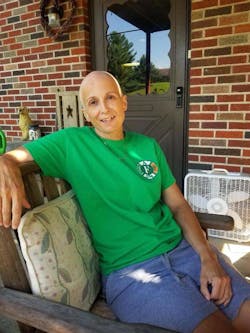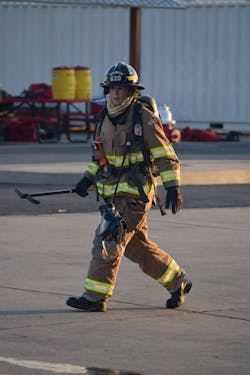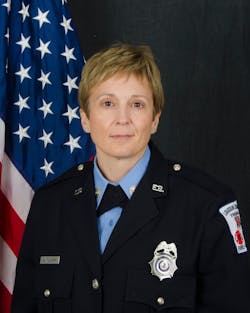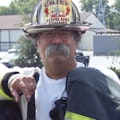Close Calls: A Firefighter’s Fight for Survival
Struck by a car? Fall through a floor? Experience a roof collapse, flashover or smoke explosion? Those are the “traditional” close calls and critical incidents I have been writing about in this column for a couple of decades. And they are very real and could happen to any one of us.
Statistically, our strongest chance of experiencing a close call or line-of-duty death (LODD) occurs when we are operating on roadways. This is a very real threat to our safety. I just returned from the funeral of Hanover County, VA, Fire-EMS Lt. Brad Clark (Rest in Peace), who gave his life while saving others. Brad’s last words were screaming to warn his crew as a big rig approached and struck their apparatus.
When we look beyond the trauma-related events, we see heart attacks and strokes at the top of the list of LODD causes, but then, jumping way off the charts is our absolute greatest chance for a close call: firefighter occupational cancer.
We didn’t even know what that was just 10 short years ago, but now I would be challenged to find ANY firefighter who doesn’t know a firefighter with cancer or who isn’t dealing with it themselves. It is everywhere, and we don’t even know the “real” numbers yet, but they will come in the future as a cancer registry system becomes reality. But the way I figure it, if each of us knows (or knew) a firefighter who has fought cancer, the numbers are nothing short of staggering.
Firefighters as “fixers”
A few weeks ago, I received an email from a lifelong friend, Melvin Byrne, a former volunteer fire chief (and career firefighter) in Loudoun County, VA, who shared a letter from Firefighter-Technician Cathy McCray—a letter she wrote to her brothers and sisters on the job about what she had been through.
Jurisdictions must own part of the responsibility to minimize firefighter occupational cancer, but there are other “stakeholders” as well, including each firefighter and their officer. It’s amazing to still see members throughout the country with faces covered in soot as they operate at or exit a fire. We still see firefighters operating in smoke without a mask, not cleaning the crap off themselves after a fire, and officers failing miserably to enforce policy.
Are you stupid? Seriously, I don’t know how to better frame it.
Sure, I remember in the 70s when after a “good” fire, we would blow our noses for days after to see who still was blowing black snot. I’m serious. After all, what did we know? But that was then, and years later, after watching our brothers and sisters rot away from cancer, we can no longer say that we didn’t have the information. And yet, we still see the no-excuse stupidity. Don’t wait until you have some pain or piss blood and THEN discover that everything in your life is now changing. Don’t breathe that crap, don’t absorb that crap, and make sure you wipe off that crap!
Need a motivator? Look at the pictures in your smartphone, in your wallet or posted in your locker. Think about who you say “I love you” to on the phone before you hang up and who sits across from you at your holiday tables. How would they be impacted by you not taking care of yourself?
By nature, most firefighters are fixers. I never gave it much thought, but when my wife Teri pointed out a few personality traits to me years ago, I had this great awakening that when there are problems, I want them fixed NOW. Problems with my kids? Let’s fix it NOW. Fight with my wife? Fix it NOW. Car problem? Fix it NOW. A/C out? Fix it NOW. And when we go to a fire or emergency, we want to—and almost always can—fix it NOW.
Like most of us, Cathy McCray is a fixer, and she wanted to fix her cancer NOW! When we are unable to fix problems immediately, we, “the fixers,” face great difficulty. Keep this in mind as you read the following account from Cathy about how everything in her life changed in an instant.
“I just shut down”
Does it matter to you?
I get to come back to work. I never thought I would be sitting here pondering this question and sharing it with the readers of Firehouse’s Close Calls column. I am not the same person, and I don’t know what to expect. I didn’t have a traumatic injury from that big job that everyone hopes to work and thinks that they identify with. It didn’t occur to me that I would one day have to take a step back into reality and figure out who I am and what I am really made of.
On April 14, 2018, I went through my annual NFPA 1582 work physical. I had perfect results. Then on May 30, 2018, I was diagnosed with Stage III ovarian cancer.
I had abdominal pain for about a week prior and decided I should go get checked. I had a scan and it showed that there was a mass that had spread to my stomach, colon, a kidney and other regions. The ER staff immediately thought it was cancer.
I think I stopped listening. It was hard to think about anything. I wasn’t sure how to tell people and who I should call first. I didn’t want to say those words. It was so dreadful and heavy.
I did not have any physical ailments that were alarming to me at that time. I did have times where I was very depressed and just not myself. A nurse told me that this was common for cancer patients and that it was the cancer sucking the life out of you. I was in the hospital for 13–14 days. This is a lot of time to ponder. I remember the surgical teams coming every morning and they would poke around trying to find a mass but could not. It was only revealed by a scan. I would always say the same things to the doctors. I told them that my work physical in April was perfect and I just wasn’t sure if this was cancer.
One of the doctors finally looked me in the eye and said, “Of course it was perfect; they did not check you for cancer.”
I had nothing to say to that. I just shut down. I had unrealistic expectations and then reality set in. I always went to my primary care physician to go over the results of my work physicals. I had mammograms and pelvic exams, chest X-rays and blood work. I talked to the doctors regularly. I just didn’t understand how this could happen.
The doctors felt that it was already in a late stage—and they were right. I was told that the only way to find this cancer mass is from a scan. I didn’t think I was coming out of the hospital. I had to make some important decisions quick and it was crazy.
The surgeon was able to remove all of it but had to remove part of my colon and reattach it to my stomach. I now have permanent staples in my gut. It took about 6–8 weeks to recover from the surgery. I went through some chemotherapy and am currently taking another drug that prevents cells from producing blood vessels. It is supposed to be preventive maintenance. My doctor says I am too young not to do it. I am 45 years old and this is hard.
I went home to where I grew up in order to recover and go through treatments. I wanted the comforts of home, but I did not want my family to see me this way. It was one of the hardest things for me to manage. I was always the one that fixed everything and now I couldn’t fix myself.
“It was my identity”
I started my career as a volunteer firefighter in West Virginia in September 1993 and became an adjunct instructor for West Virginia University Fire Service Extension in July 2006. I have been working as a firefighter in Loudoun County since July 14, 2005. I was promoted to technician (apparatus operator, acting officer) on July 10, 2008. I went through 26 weeks of recruit school training and then off to the field to work among the troops. Recruit school was a lot for me. I came from an area where I would not have learned in the manner that I did had I not accepted the position. I sit here and think of all the crazy stories during my training and all those large incidents that I could tell you about because I thought it was my identity.
I never thought about anything else.
Granted, it was hard enough being a woman and trying to blend in. I worked hard. That’s what people would say: “She is a hard worker.” It was so grueling sometimes. I never thought twice about letting someone else step up. I always wanted to do my share and often worried that I wasn’t doing enough. This was who I tried to be.
I cry sometimes at night because I never wanted this to happen to me—and it did. It’s like I have let everybody down and have done something terrible. I am not that person who I thought I was. I don’t know if I will ever be the same, but I just know what it feels like right now. I’m just trying to be honest about what has happened to me.
“I was in a state of readiness”
I went through some tough medical procedures and I had to be held down. I would tell the staff they were building my character. I wasn’t calm, though. I was yelling and could not stop the tears. The side effects from the chemotherapy are no joke. I do think that everyone handles them differently. I laid on the bathroom floor sometimes and wondered if I would be able to finish the treatments. I would talk to God. I told Him that I loved Him anyways even though I did not understand everything and that it could be worse, and then I would tell myself to “keep moving forward,” and I would make myself get up and lay on the bed.
I’m not sure if it is appropriate to talk about these things because it’s reality and we often avoid it because it’s not cool. It took over a week for the side effects to calm down. It was extremely hard to ride it out. The days were so long but there were great victories each night. I tried to remember my work days, so I could be productive on those days and think about work things.
The fatigue would hit me like a wall and I would have to stop and lay down regardless of where I was. I would just say, “I don’t want this,” but I knew I had to keep going. I would figure out ways to get through each part of the day. Whatever symptoms I had, I would create a plan on how to deal with them the next time. I could not make them go away, but I knew what mindset I needed and what I could do as it was happening to me. I was in a state of readiness.
I had to survive through rough waters for about 10 days and then everything would calm down. Could I tread water for that long?
“Am I responsible?”
I wanted to have a positive impact regardless of what was happening to me, and this is something that you must choose to do. It doesn’t come naturally. Does that matter to people?
I started thinking about the things that I did not identify myself with, all those things that I thought were unnecessary. I would attend training and we would burn all morning and then break for lunch, then continue into the afternoon. I would sweat profusely, and I can remember the feeling of sweat running down the inside of my clothes.
Sometimes I would change into a dry shirt at lunch. That helped, but I didn’t think about what was happening at another level. I never thought about carcinogens, soot or anything else that could absorb into my skin.
I didn’t always immediately clean up afterward. I worked a lot of hours at the training academy even after I was released into the field. I just wanted to do my part, and I knew it would help me to stay conditioned. On most days, I just wanted to go home and be in the comfort of my own shower, and then there were the days when someone had already locked the doors and there wasn’t the opportunity to get cleaned up. I just didn’t think it would affect me. Did my own actions cause me to have cancer? Am I responsible?
I love my job regardless of what is happening to me. I just never imagined I would be sitting here trying to promote cancer awareness from this capacity. We began hearing of individuals who were diagnosed with cancer and it was stated as “occupational.” I began noticing the “wash your hood on Sundays” emails. We were also offered an additional 30 minutes of overtime at the academy to get cleaned up after burn days.
I would listen to my coworkers make sarcastic remarks about cleaning our gear and ourselves, and some even laughed. I was usually one who didn’t say anything. I just kept thinking that these guys are our next generation and they have been enabled to become arrogant and look down on those whose jobs are to take care of us and provide us with what is necessary for safe operations. It was frustrating because I knew someone out there was beginning to recognize that we needed to put more effort into a different culture, and I wasn’t sure how to deal with the resistance that was being displayed.
I was part of the problem.
“It has changed me”
Doing our job is not always going to fix everything. Sometimes our job is to simply mentor and be an example to those coming in. It doesn’t matter how many fires you run or what color tape/paint is on the hand tools. It doesn’t matter if you don’t get to search every time or who gets there first. If these matter more than you, you are not who you think you really are, and everyone else sees it but you.
I don’t have all the answers, but the necessary changes to the fire service come from our actions—and actions speak louder than words. No one likes to change unless they are the one with the idea of change. If we want our actions to go far and make an impact, they must come with the attitude of respect and humility. If we don’t have these, we don’t have leadership. If we don’t have leadership, nothing will grow and there is no innovation. We will just sit and rot until there is nothing left.
I don’t want to reflect a negative attitude with what has happened to me. I have talked about a lot of unpleasant things, but I believe it is necessary. I don’t know if I will ever embrace everything. I realize we can’t live in the past, but I believe that my past will save somebody’s future. I know there needs to be some change with how we do things and I know that change is being worked on.
It’s been difficult but I am learning a lot. I know it well help me as I move forward, and I hope that somehow my experience will create a positive effort among the troops. We are own advocates, and we must protect ourselves as much as we can. My doctor says I can return to work now. I did not think I was coming back to work. I am humbled and willing to work hard at returning to the capacity that will be expected of me. I am not the same, and I am unsure of a lot of things now, but I don’t ever want to have unrealistic expectations again. It won’t matter until it happens to you.
From Chief Goldfeder
I hope that Cathy’s story had the same impact on you that it did on me, because it shook me. In my various roles, I have the opportunity to help at many levels with critical injuries, illnesses/cancer and, of course, LODDs. And while they all strike emotional levels, Cathy’s story was one that I felt I had to share with all of you. Please make sure you share it with all those you work with as well.
To be clear, Cathy is one of the lucky and blessed ones, as she has survived. Sadly, each day we learn about firefighters who are losing the battle against occupational cancer.
Why do some make it and some don’t? That may be the toughest question out there. But what we do know is that there are several ways that all of us CAN minimize our exposures to all the crap that we encounter on the fireground.
A few of the nationally recognized tips from the Firefighter Cancer Support Network (FCSN) include:
· Don’t ever breathe that crap. Use SCBA from initial attack through overhaul. Chiefs, establish a zero-tolerance policy and enforce it at every level.
· Do gross decon of all PPE on scene to remove as much soot and particulates as possible. Pretend that the fire was a hazmat—now do that “decon” stuff.
· Clean your bunker gear, gloves, hood and helmet immediately after a fire—at scene is better. A second set to change into at scene is best. Sound like a hassle? Where there’s a will, there’s a way.
· Use wipes to remove as much soot as possible from your head, neck, jaw, throat, underarms and hands immediately and while still on the scene. Wipe it all.
· Change your clothes, and bag and wash them immediately after a fire.
· Shower thoroughly after a fire. That smoke smell in the showers means to keep washing—the bad stuff is in you.
· Do not take contaminated clothes or PPE home or store it in your vehicle.
· Decon fire apparatus interiors after fires.
· Keep bunker gear out of living and sleeping quarters.
· Check out NotInOurHouse.com. These are resources to keep firefighters and their families safe inside and outside the house—and the firehouse.
· Get a copy of the IAFC Safety, Health & Survival Section’s Healthcare Provider’s Guide to Firefighter Physicals. It is available at no cost as a download at IAFCSafety.org.
· Have your physician use the above guide to lead their evaluation of you.
Final thoughts
Especially during this holiday season, we are very thankful that Cathy is able to share her story. We are hopeful that those of you reading this will take her story to heart—and take action—by doing everything possible to minimize the chance that you (and those you work with at your firehouse) will have to experience what Cathy did. By her own words, and the words of those in her life, it is certainly worth it.
Additionally, while we as firefighters are focused on taking care of others, but maybe not ourselves, we often forget about the impact we can have on those around us. With that in mind, when discussing this story with Cathy, I asked for some perspective from her family members, and we’ll focus on their comments next month.
My sincere thanks to Loudoun County Firefighter-Technician Cathy McCray for sharing her genuine “wake-up” story with us.
About the Author
Billy Goldfeder
BILLY GOLDFEDER, EFO, who is a Firehouse contributing editor, has been a firefighter since 1973 and a chief officer since 1982. He is deputy fire chief of the Loveland-Symmes Fire Department in Ohio, which is an ISO Class 1, CPSE and CAAS-accredited department. Goldfeder has served on numerous NFPA and International Association of Fire Chiefs (IAFC) committees. He is on the board of directors of the IAFC Safety, Health and Survival Section and the National Fallen Firefighters Foundation.



